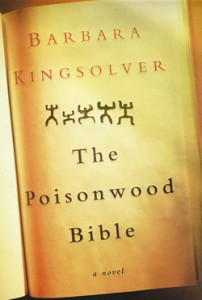 I’ve been hearing about The Poisonwood Bible by Barbara Kingsolver since 1998, but have just now finished reading it. It is extraordinary. Having lived in Africa for two years, the novel was probably more meaningful to me, but this book will appeal to anyone interested in a world view of humanity.
I’ve been hearing about The Poisonwood Bible by Barbara Kingsolver since 1998, but have just now finished reading it. It is extraordinary. Having lived in Africa for two years, the novel was probably more meaningful to me, but this book will appeal to anyone interested in a world view of humanity.
Nathan Price, an evangelical Baptist minister, his wife and four daughters trek to a mission in the Belgian Congo in 1959. Nathan, a self-righteous bully is set on changing the village people of Kilanga to his view of Christianity.
The story is told in the voices of Nathan’s wife and their four daughters. Although Kingsolver titles each chapter with the name of the speaker, she wouldn’t have needed to. The author’s characterization is so good that within a few words you know exactly who is speaking. Orleanna, Nathan’s wife, tries to be obedient to her husband, but after years of struggle, is tired. The challenges of living in the Congo are seemingly insurmountable. She simply cannot adequately feed a family on what the local people eat. Rachel, almost 16, has a dry sense of humor and is immensely unhappy with her surroundings She longs to be a typical American teen. Leah, 14, walks in her father’s footsteps, hoping to find favor with him. She is eager to do things the “local way” and to make friends. Leah’s twin sister Adah, born handicapped with the left side of her body underdeveloped, is an observer and a deep thinker. She has a jaded view of her father’s occupation. The twins are considered “gifted” and learn languages and complicated concepts quickly. Ruth May, at 5 is the baby of the family and strives to keep up with her sisters. She organizes her little village friends into some semblance of order as she teaches them “Mother May I.”
While Nathan Price unsuccessfully tries to convert the villagers, rumblings of new leadership in the Congo are stirring. Patrice Lumumba is suddenly the Prime Minister of the Republic of the Congo, a newly independent country, and the Belgians are pulling out. The mission society in America will no longer support the Price family and they are told to leave. But Nathan’s work is not finished and he will not comply.
While political upheaval keeps the Congo in disarray, the Price family is facing its own challenges. When tragedy strikes, the family is profoundly affected. The novel then follows the various directions the family takes over a course of three decades.
The Poisonwood Bible offers an in-depth view of the many injustices affecting Africa. Outside political influences have claimed the wealth and energy from many African countries, but particularly the Congo with its treasure in gems.
I highly recommend this novel. Author Kingsolver deals with the realties of domestic tragedy and the everyday business of surviving in a country lacking basic needs. The book also offers insights to Africa’s bloody struggle for basic human rights, rights that have been ripped from them by outside powers.


I read the Poisionwood Bible years ago. “Nathan, a self-righteous bully…” aptly describes my memory of him! Your descriptions of the family members brought back their many struggles that, many times, originated because of the obsessed father’s need to be in control, making their hardships of living in Africa ever more difficult.
I, too, enjoyed this book, Mary, as much for the structure and character building as for the story–maybe more so. As you say, the different voices were done spectacularly well. I have sometimes picked it up again to see how Barbara Kingsolver did such extraordinary writing, as she usually does, but this book took her higher and better.
This was my first Kingsolver book, but certainly not my last. All the way through I marveled at her writing skill.
This book beautifully portrays Congo, the locals and their culture, and a family’s struggles because of misguided mission of one man. Thank you, Mary , for reminding me of this excellent novel.
You’re correct, Hema. I think many missionaries do a marvelous job, but this man…. As you say, misguided.
This does sound good. It would be such a struggle for a teenager who just wants to be “normal”. Thank you for sharing, Mary!
At the time we lived in The Gambia, I thought having kids there would be tough. Even more so in the Congo.